
A lottery is a popular way to raise money. Often, the proceeds from lotteries are used to support good causes, such as schools and parks. However, lottery tickets can be expensive and can also be addictive. Moreover, the chances of winning are very slim.
The origins of the lottery can be traced back centuries. Ancient Egyptians, for example, held public lotteries to raise money for their pyramids. During the Middle Ages, European countries like Belgium and France held public lotteries to raise money for town fortifications, and to help the poor.
Regardless of the origin, the lottery is an important and widely played game worldwide. In fact, it is one of the few games that doesn’t discriminate between people based on their upbringing, religion or race.
While it may seem that the lottery is a luck game, there is actually a system behind the process of selecting winning numbers. There are many different methods of picking a set of numbers, but no number is more or less likely to win than another.
Richard has been playing the lottery for years and he knows a thing or two about winning. He has won several jackpots and shares the same strategies that he teaches in his book, How to Win the Lottery.
His strategies are based on math and logic, and not on some magic formula that only a few people know. If you follow his methods, there is a very high chance that you will also be able to win some jackpots.
He has taught thousands of people how to pick their winning numbers, and many of them have been lucky enough to win multiple times. He has also shared his tips on how to manage your bankroll and ensure that you don’t get carried away with gambling and lose everything that you have.
When you buy a lottery ticket, make sure that you keep it in a safe place where it can be easily found. You should also keep track of the date and time of the drawing, so that you don’t miss it.
Generally, the winnings of lottery games are paid out in cash or in a lump sum. In some cases, they are also given in installments over a period of time. In addition, in some jurisdictions, the amount of a prize depends on how much income tax was withheld from the winner’s winnings.
In general, the value of a prize is equal to the total amount that the promoter raises after deducting expenses. Some states have joined together to run multi-state lottery games, which offer larger purses. These games have lower odds of winning, but they also have higher payouts.
Aside from the monetary value of a prize, lottery winners also receive their winnings as an interest-free loan to the government during the period that they own the ticket. This can be an appealing feature for some people, but the financial cost of the ticket is very high, and there is a high risk that the winner will become broke before the prize is fully paid out.